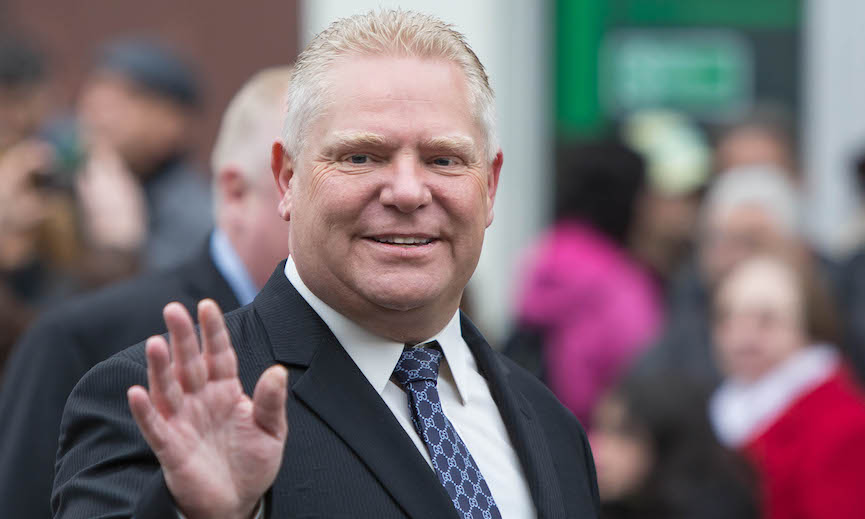A psychotherapist I know was kvetching recently about Ford government intentions to defund long-term psychotherapy (as opposed to brief treatment courses, prescribing drugs etc.) in order to save “the taxpayers” money.
This would eliminate payments to shrinks and family doctors who do therapy on everything from eating disorders to PTSD or depression. She said, aside from the perceived savings, she doesn’t think this government wants to encourage thinking and reflection, which is what extensive talk therapies truck in.
That got me pondering the value placed on thought in budget calculations. Doug Ford’s tax cuts will lower provincial revenues by $22 billion, necessitating spending decreases. The goal is, allegedly, saving us money. But what if there’s an additional effect: diminishing the level of critical thought Ontarians give to public issues.
I’m not saying that’s an overt purpose. It’s hard to picture Ford entertaining more than one goal at a time. But it could be a collateral benefit, perhaps “unconsciously,” which only extended talk therapy might reveal.
Take this week’s mind-bending announcement that Ford has appointed a failed Tory candidate to head EQAO, the office that runs standardized testing, at — here’s the shocker — $140,000. That’s up from around $4,000. A recent EQAO chair says he can’t even picture what a full-time head would do. This doesn’t seem consistent with Ford’s stated goals, er, “goal.”
OTOH, standardized tests are the antithesis to teaching kids to think: you train them to shut down thought in order to pass tests. You deduct classroom time from stimulating their minds to bore them with test-taking drills. Fine teachers have left the profession because this isn’t what they signed on for. But if less thought is an objective, even unconsciously, Ford’s guy may come cheap at $140,000.
Or take universities. Ford has thrown Ontario’s students into panic by removing their financial supports, or converting them to loans — just in time for the normal bedlam of midterms. Anxiety thrives. Calculating the affordability of remaining in school disrupts exam prep or writing essays. One pressure keeping them on is that student loans now come due instantly, if you drop out. Dorm sessions on politics or film turn into: who understands these new rules?
It’s always worth recalling how Ford handled a crisis — a faculty strike, it happens — during his own post-sec time at Humber College: don a suit, amble over to dad’s business, and start working full-time. Never return to school.
He’s cancelled fees that support campus groups and governments since “Students were forced into unions and forced to pay,” suggesting he doesn’t know the difference between student unions and labour unions. And “we all know what kind of crazy Marxist nonsense” they “get up to.” Personally, I’d pay a special tax just to hear what Doug Ford thinks Marxism is. But student unions are democratic bodies, they’re held highly accountable — just this month at Ryerson. They are precisely about educating citizens in democratic processes.
When students came to Queen’s Park question period and shouted at Ford, he railed, “They should have their mouths washed out with soap. That’s what they should have.” He’d managed, momentarily, to get them onto his level, and teach ’em something.
Or take his scheme for autistic kids. It’s meant to “clear” the claims in the system. (He should wash his own mouth out. We’re talking about kids.) It’s utterly inadequate, throws the burden massively onto parents, whose lives will be shattered. And tosses those kids back into regular classrooms without proper readiness, making teaching unmanageable. Except maybe, drills for tests.
I’m quite serious about the anti-thinking agenda. There are theories on how societies generate fundamental change and one is through public education: creating citizens who can’t be manipulated since they think for themselves. Ontario has a noble history, going back to Egerton Ryerson in the mid-1800s.
I’ve had a fair amount of talk therapy myself over the years and you’re never quite sure if it works. But it does make you think and one thing you think about is: how do you know if it works and how do you judge success? Those are similar questions to what political thinking consists of: what is a worthwhile life and what kind of society is most likely to lead its members there?
This story also appeared in the Toronto Star.
Image: Bruce Reeve/Wikimedia Commons
Help make rabble sustainable. Please consider supporting our work with a monthly donation. Support rabble.ca today for as little as $1 per month!




